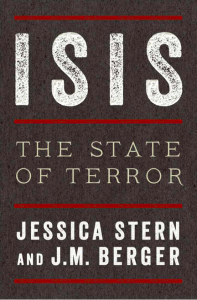We must fight their growing power any way, anywhere, we can. With words, with weapons, with sincere efforts at warm embrace for those who might otherwise be pulled or pushed into their dark world that would exterminate all who dare be free and different.
I think that most of us comfort ourselves with the thought that “they can’t win,” at least in the long run, that they must burn themselves out in their frenzy . . . . But this may be dead wrong. Why is it that so many young people are being drawn into this increasingly powerful destroyer of human rights, which despises the very idea of government of and by the people? — Scott Atran in correspondence with Professor Hoodbhoy in wake of UN address
Military operations are obviously necessary but ISIS is not a conventional army. The risks of the wrong kind of military attack are warned against by Stern and Berger in ISIS: The State of Terror:
Even ground forces would likely not be enough to completely destroy ISIS. Absent a military invasion that would somehow— improbably, magically— transform both Iraq and Syria into truly viable, pluralistic states in which Sunnis and Shi’a both feel secure, ISIS would likely remain, at least as a terrorist group, for many years to come.
Beyond the necessity to oversee political change in both Iraq and Syria, a tall order indeed, the international impact of ISIS must also be considered, as it inspires oaths of loyalty and acts of violence in nearly every corner of the globe. As with its military might, ISIS’s potential to wreak terrorism has been limited until now, although the alignment of regional terror groups such as Jund al Khalifah in Algeria and Ansar Bayt al Maqdis in Egypt raise serious concerns going forward.
6 Millenarianism involves the expectation of sweeping societal change, possibly as a result of the apocalypse.The broader problem is that jihadism has become a millenarian movement6 with mass appeal, in some ways similar to the revolutionary movements of the 1960s and ’70s, although its goals and the values it represents are far different.
Today’s radicals are expressing their dissatisfaction with the status quo by making war, not love. They are seduced by Thanatos rather than Eros. They “love death as much as you [in the West] love life,” in Osama bin Laden’s famous and often-paraphrased words. In this dark new world, children are seen to reenact beheadings with their toys, seduced by a familiar drama of the good guys killing the bad guys in order to save the world. Twitter users adopt the black flag by the tens of thousands. And people who barely know anything about Islam or Iraq are inspired to emulate ISIS’s brutal beheadings.
ISIS has established itself as a new paradigm, one that is more brutal, more sectarian, and more apocalyptic in its thinking than the groups that preceded it. ISIS is the crack cocaine of violent extremism, all of the elements that make it so alluring and addictive purified into a crystallized form.
ISIS’s goals are impossible, ludicrous, but that does not mean it can be easily destroyed. Our policies must look to the possible, which means containing and hopefully eliminating its military threat and choking off its export of ideas.
But certainly the history of ISIS and al Qaeda before it show that overwhelming military force is not a solution to hybrid organizations that straddle the line between terrorism and insurgency.
Our hammer strikes on al Qaeda spread its splinters around the world. Whatever approach we take in Iraq and Syria must be focused on containment and constriction, rather than simply smashing ISIS into ever more virulent bits. Continue reading “ISIS: The First Step To Combating It”

